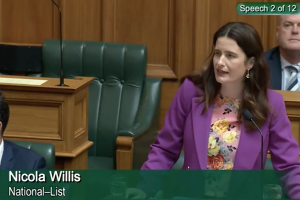National criticises new conduct bill
The new bill to regulate conduct of financial institutions started its second reading in Parliament yesterday and was immediately criticised by the National Party.
Friday, June 11th 2021, 8:08AM  2 Comments
2 Comments
by Staff reporters

Minister Poto Williams started the second reading of the Financial Markets (Conduct of Institutions) Amendment Bill yesterday outlining the changes and why new regulations were needed.
However, National MP Nicola Willis immediately criticised it as "...a compliance heavy, box ticking exercise".
Willis said her party opposes the bill but acknowledged the fact that "...financial institutions, banks, insurers and the like should have controls in place to ensure they are focused on the best interests of their customers".
Williams said 59 submissions were made on the bill and the majority supported it. However, the Ministry of Business, Innovation and Employment is current undertaking a second round of consultation with Williams stating there would be further amendments to the bill.
The minister said the bill fills a legislative gap and it is important to ensure consumers are treated fairly.
She said there can be an imbalance of power between institutions and customers. "It is vital that New Zealanders can trust these institutions."
Institutions will be expected to have a "fair conduct programme" to ensure customers are treated fairly.
"The select committee has recommended that minimum requirements for fair conduct programmes be clarified and included in the bill. This is in response to submitters feedback that leaving the detail of conduct programmes to regulations would leave the regime uncertain."
Under the bill the minister will have the power to make regulations related to incentives. Cabinet has already banned value or volume based incentives and the minister will have a list of matters that have to be considered.
Also intermediaries, such as financial advisers, will not have to comply with an institution's conduct programme.
Some concerns were raised that this regulation making power was too broad. In response, the minister said the group of intermediaries this power extends to has been narrowed.
MBIE is currently consulting on intermediary provisions for the bill "...to ensure the intermediary obligations are right sized and will work in practice".
The second reading of the bill was interrupted by retiring MP Nick Smith's valedictory speech and will continue from 2pm, Tuesday June 22.
To view the bill, click here.
| « Financial Advice NZ launches new liability cover offering | Mann on a mission to diversify financial advice » |
Special Offers
Comments from our readers
Where this gets wobbly is when the provider starts breathing down your neck about what you are advising and why you are or are not advising on their products. Though I doubt we will see any provider comment about why their product has been advised, the self-interest issue isn't going to be solved by this.
However, as I pointed out to Southern Cross a few weeks back, as advisers we don't have to have agency agreements or contracts with providers to provide advice to clients.
Yes, operationally for implementation, commission and service reporting we do. But that's not a requirement to give advice to clients.
At the same time, it is completely feasible that a fee-based advice business that advises clients and they implement that advice with their chosen provider. I think risk is a long way from this, but it is an answer that some advisers may choose, and many investment advisers already do.
Sign In to add your comment
| Printable version | Email to a friend |




Financial institutions have to have a fair conduct programme that sets out how they are going to apply the fair conduct principle.
The following bits of the Bill set out what these FIs have to do with respect to their intermediaries
"(b) requiring the following to follow the procedures or processes that are necessary or desirable to support the financial institution’s compliance with the fair conduct principle:
(i) ...........:
(ii) the intermediaries that are involved in the provision of the financial institution’s relevant services or associated products; and
(bb) requiring initial and regular ongoing training for each of those ……. intermediaries on the following matters to the extent that the training is relevant to their involvement in providing the financial institution’s relevant services or associated products:
(i) the relevant services or associated products that the ....... intermediary will be involved in providing; and
(ii) the fair conduct programme and the procedures or processes referred to in paragraph (b) that the ......... intermediary must follow; and
(bc) checking that each of those ………. intermediaries has completed that training and has a reasonable understanding of the matters that have been covered by that training; and
(bd) managing or supervising each of those .............. intermediaries to ensure that they are supporting the financial institution’s compliance with the fair conduct principle, and monitoring whether those persons are giving that support, including by—
(i) obtaining reasonable assurance that each ,,,,,,,,,,,,, intermediary is competent and otherwise a fit and proper person to carry out the range of work for which they will be, or are, employed or engaged (in relation to the financial institution’s relevant services or associated products); and
(ii) setting conduct expectations for those persons; and
(iii) establishing robust and transparent procedures or processes for dealing with misconduct by those persons; and
(iv) monitoring whether consumers have been treated by those persons in a manner that is consistent with the fair conduct principle.
Are you looking forward to all of this?